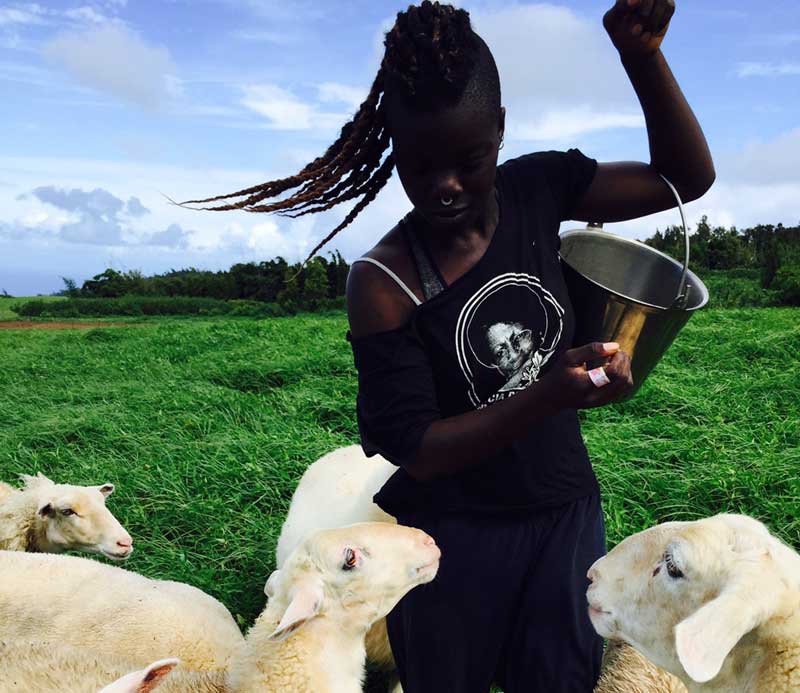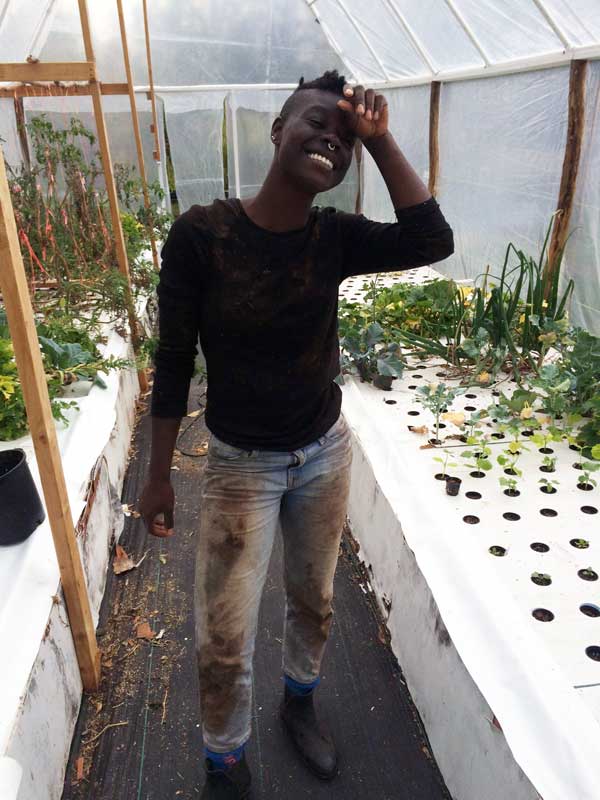Farm Confessional: How to Tell People You’ve Decided to Become a Farmer
As a 23-year-old British-born Ghanaian woman is finding it difficult to give people the answer they’re looking for.
Farm Confessional: How to Tell People You’ve Decided to Become a Farmer
As a 23-year-old British-born Ghanaian woman is finding it difficult to give people the answer they’re looking for.

It’s all I need to say. ‘Fess up to my hippie aspirations and be on with my day – or my glass of wine, as the case may be.
Instead, I adjust my grip on the stem, take a breath, and launch into a hazy, emotionally abbreviated sketch of what could loosely be described as my five-year plan: move to Ghana, buy two acres of land, start an organic vegetable farm, teach kids how to do the same.
I’ve started to notice how often I’ll add in a “well, we’ll see” because I can’t quite hide that I’m not sure of my plan or myself. As a novice farmer and first-time entrepreneur, certainty is something that I have only in short supply.
But an hour into this dinner party – and more than a few glasses into the Pinot – I’ve managed to feign enough confidence to survive several “What are you up to?” conversational bombs. Apparently this question, along with the plainly diabolical “What’s your plan?”, are requisites in a group of parents and young people not long – but long enough – out of college.
As a 23-year-old British-born Ghanaian woman, an educator, an artist who arbitrarily makes films or writes stories “when I feel like it,” and a farmer’s apprentice with a degree in anthropology from Stanford University, I’ve been finding it hard to give a coherent answer.
We’re all wondering what I’m doing.
We’re all wondering what I’m doing.
Sometimes I can cobble something reasonable (even admirable!) together. For instance: I’ve loved teaching kids how to get to know themselves and their communities through the documentary filmmaking workshops I’ve done in Ghana. In my mind, the logical next step is to teach them how to support themselves and their communities. Why not do that via something as nourishing as natural farming? Hence my current apprenticeship on an organic farm in a tropical climate; I’ve got to learn how to do it myself first.
If I speak with enough enthusiasm and speed I can overwhelm any concerns or questions before they become more than lightly creased eyes and slightly plastic smiles. But sometimes I can’t quite manage the conversational gymnastics required of “What’s your plan?”

One wonderful mother smiles and makes the universal “say no more” hand gesture as I struggle to make communicate all the ideas and experience I’m holding in my head. “I understand!” she says generously. “Your vision is incubating; you’re not ready to share it yet.” I un-squint my eyes, un-purse my lips, and after a moment of surprise release a smile and a “Yes!”
That’s precisely it.
There is so much to what it means to be a farmer – to my decision to become a farmer – that it is difficult to give people the simple, well-defined answer they are looking for. I don’t have a fully fledged plan. I have a few ideas, an education behind me, and a surprising amount of faith.
When I think or say “I’ve decided to become a farmer” I’m thinking beyond my decision to learn the trade through my current apprenticeship; beyond knowing when the growing season is and why nitrogen is good for plants. (By the way, that sentence encompasses all the things I’ve learnt from starting to live as a farmer and from living with farmers.) Farmer life is more than just physical labor and science; it’s the excited joyful feeling of sprouting seeds and harvesting plants; it’s self-reliance and community; it’s the unremarkable peace of living with the land and nourishing an inquisitive imagination. I envision not a job or even a career, but creating the conditions for my mind and body to experience equanimity and growth.
I have a lot of visions.
As a young woman of color, what does it mean for me to go “back to the land?” To be excited to be toiling in the fields? Am I squandering important opportunities to show the world what a young black woman with my privilege and social capital can do?
But I try not to have any illusions. Being a farmer is not built on faith alone. It’s a lot of hard work, and it’s often very stressful. I’m already experiencing anxiety over deciding on a garden plan. What’s going to work best in the space? Will I be making the most efficient use of the land? Is there something I’m missing? Is my garden going to be beautiful? What seems so straightforward quickly turns into a monumental decision that calls into question my intelligence, my skill, my creativity. And it’s not even (yet) a matter of my entire livelihood – just my ego as a student who wants to do well. There’s also the question of land: How do I find the money to purchase it? Am I even qualified to be responsible for land, let alone build a business and a life on it?
Then, in some ways, I’m afraid it’s inappropriate. After four years of “elite” academic college education, I worry my aspirations don’t fit with the cultural and financial investment that’s been made in me.
As a young woman of color, what does it mean for me to go “back to the land?” To be excited to be toiling in the fields? Am I squandering important opportunities to show the world what a young black woman with my privilege and social capital can do? Inevitably, I’m acutely aware of the deeper historical and cultural resonances of my individual choices.
But, beneath the fears and the rough explanations of “my plan,” I know that I have to opt into what is appropriate for me. I can only do what I am driven to do, and that’s creating a sustainable home for my mind and body. I’m committing to my belief that we can have an intimate, uncompetitive relationship with the world around us. Being a farmer is my way of caring about the environment, people, and myself.
I still don’t have a ready or detailed answer to “What’s your plan?” And I’m a little nervous about that. But I trust that if I commit to being a farmer, if I toil hard doing the work I already enjoy, and rely on a little bit of luck, I’ll literally get to see all the fruits (and vegetables, and fields, and trees) of my labor.
Now just to tell my mother.
Follow us

This work is licensed under a Creative Commons Attribution-NoDerivatives 4.0 International License.
Want to republish a Modern Farmer story?
We are happy for Modern Farmer stories to be shared, and encourage you to republish our articles for your audience. When doing so, we ask that you follow these guidelines:
Please credit us and our writers
For the author byline, please use “Author Name, Modern Farmer.” At the top of our stories, if on the web, please include this text and link: “This story was originally published by Modern Farmer.”
Please make sure to include a link back to either our home page or the article URL.
At the bottom of the story, please include the following text:
“Modern Farmer is a nonprofit initiative dedicated to raising awareness and catalyzing action at the intersection of food, agriculture, and society. Read more at <link>Modern Farmer</link>.”
Use our widget
We’d like to be able to track our stories, so we ask that if you republish our content, you do so using our widget (located on the left hand side of the article). The HTML code has a built-in tracker that tells us the data and domain where the story was published, as well as view counts.
Check the image requirements
It’s your responsibility to confirm you're licensed to republish images in our articles. Some images, such as those from commercial providers, don't allow their images to be republished without permission or payment. Copyright terms are generally listed in the image caption and attribution. You are welcome to omit our images or substitute with your own. Charts and interactive graphics follow the same rules.
Don’t change too much. Or, ask us first.
Articles must be republished in their entirety. It’s okay to change references to time (“today” to “yesterday”) or location (“Iowa City, IA” to “here”). But please keep everything else the same.
If you feel strongly that a more material edit needs to be made, get in touch with us at [email protected]. We’re happy to discuss it with the original author, but we must have prior approval for changes before publication.
Special cases
Extracts. You may run the first few lines or paragraphs of the article and then say: “Read the full article at Modern Farmer” with a link back to the original article.
Quotes. You may quote authors provided you include a link back to the article URL.
Translations. These require writer approval. To inquire about translation of a Modern Farmer article, contact us at [email protected]
Signed consent / copyright release forms. These are not required, provided you are following these guidelines.
Print. Articles can be republished in print under these same rules, with the exception that you do not need to include the links.
Tag us
When sharing the story on social media, please tag us using the following: - Twitter (@ModFarm) - Facebook (@ModernFarmerMedia) - Instagram (@modfarm)
Use our content respectfully
Modern Farmer is a nonprofit and as such we share our content for free and in good faith in order to reach new audiences. Respectfully,
No selling ads against our stories. It’s okay to put our stories on pages with ads.
Don’t republish our material wholesale, or automatically; you need to select stories to be republished individually.
You have no rights to sell, license, syndicate, or otherwise represent yourself as the authorized owner of our material to any third parties. This means that you cannot actively publish or submit our work for syndication to third party platforms or apps like Apple News or Google News. We understand that publishers cannot fully control when certain third parties automatically summarize or crawl content from publishers’ own sites.
Keep in touch
We want to hear from you if you love Modern Farmer content, have a collaboration idea, or anything else to share. As a nonprofit outlet, we work in service of our community and are always open to comments, feedback, and ideas. Contact us at [email protected].by Yvette Dickson-Tetteh, Modern Farmer
January 12, 2016
Modern Farmer Weekly
Solutions Hub
Innovations, ideas and inspiration. Actionable solutions for a resilient food system.
ExploreExplore other topics
Share With Us
We want to hear from Modern Farmer readers who have thoughtful commentary, actionable solutions, or helpful ideas to share.
SubmitNecessary cookies are absolutely essential for the website to function properly. This category only includes cookies that ensures basic functionalities and security features of the website. These cookies do not store any personal information.
Any cookies that may not be particularly necessary for the website to function and are used specifically to collect user personal data via analytics, ads, other embedded contents are termed as non-necessary cookies.
I really appreciate what you are all about. Agriculture is the most important thing in this world after air and water.